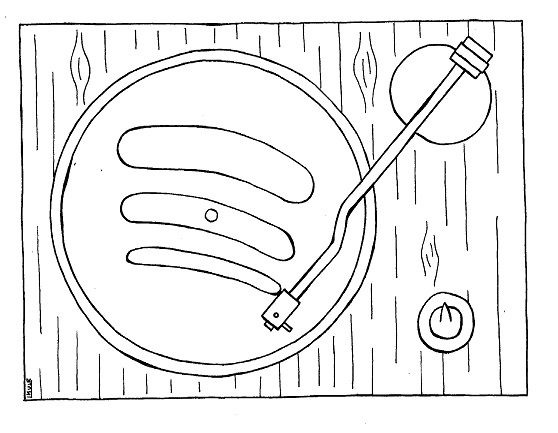
By Leslie Muir /// Opinions Editor
David Lowery is suing Spotify for $150 million over artist copyright infringement. Taylor Swift wrote an op-ed in the Wall Street Journal condemning music streaming sites, such as Spotify, that cut artists out of supposedly substantial profits. Spotify doesn’t even have my favorite Chance the Rapper album up.
So should we still use it? To be fair, online piracy does cut artists out of profits. The LA Times reports that in the United States, 20 million people use peer-to-peer file sharing sites to get music, and 7.7 million people use online streaming.
This means that the music industry raked in a cool $15 billion worldwide last year, which compared to the peak earnings in 1999 of $39 billion, also means they’re down 38%. Online music piracy has a lot to do with this, but musicians and producers, like Taylor Swift and David Lowery, see streaming sites such as Spotify as the next wave of unfair profit losses. Some artists choose not to participate in the streaming activity at all (most notably, The Beatles, until recently when a settlement was reached with Apple Music), and other artists, such as good ol’ Chance, release most of their work as free EPs and mixtapes and can’t benefit from the royalties given out by Spotify due to their own use of sampled music. None of this tells us whether or not pirating music online goes against our personal moral codes and ethics, and I’m not here to hash that debate out. I’m more curious about whether, out of all music providing mediums, Spotify truly is the best bet.
Buying all of the music in any given personal library would be ridiculous. People’s music collections are simply too extensive these days to assume that every track was honest-to-God paid for directly. Checking out the same amount from a library would also be difficult. The obvious answer for many people, especially the younger, tech-savvy generation, is to download files onto their devices. This seems like a pretty good deal, except for the fact that it is illegal, and more so than dealing with the morality of pirating music, the real-world consequences suck.
I’ve tried all of these methods for acquiring music, and the most costly by far was when I got caught for pirating music online. I was threatened with a few thousand dollar fine, before paying to cancel my internet service account and reopening an entirely new one. Before my downloading days, I was an avid library listener, checking out hundreds of CDs in just a few months (also illegally ripping some of the albums, which is still not great). And of course, I was once a middle schooler just like everyone else, who payed iTunes an exorbitant amount of money to own a few popular songs that I had heard on the Top 40 radio station. Using a Spotify Premium account for the past year has surprisingly been the cheapest option I have tried.
It’s a nice perk that using a streaming service such as Spotify helps alleviate the guilt of pirating music, but beyond keeping artists in business (to some degree), Spotify is just a better deal. If you really do not want to pay for a Premium account, you can still get a free account and have slightly more control over your music than on your Pandora radio station.
Spotify is essentially the Netflix of music. Whether Netflix, or any other monthly-pay streaming service will be a sustainable way to compensate artists as pirating technology and accessibility evolves, I cannot say. The way we listen to the music we love is bound to continue evolving, and maybe Spotify will soon be irrelevant. You can always cancel your account next year if something better has come along.
Subscribe to the Mossy Log Newsletter
Stay up to date with the goings-on at Lewis & Clark! Get the top stories or your favorite section delivered to your inbox whenever we release a new issue.

Leave a Reply